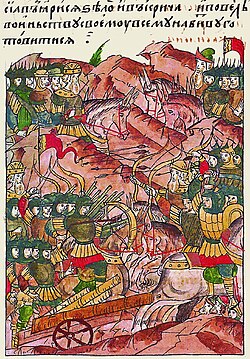Battle of the Vorskla River
| Battle of the Vorskla River | |||||||
|---|---|---|---|---|---|---|---|
 A miniature from the Personal annalistic code |
|||||||
|
|||||||
| Belligerents | |||||||
| Golden Horde |
Lithuania, Poland, Moldavia Tokhtamysh forces |
||||||
| Commanders and leaders | |||||||
|
Edigu, Temur Qutlugh |
Grand Duke Vytautas, Tokhtamysh |
||||||
| Strength | |||||||
| 90,000 | 50 princes 38,000 | ||||||
| Casualties and losses | |||||||
| Unknown | Heavy (11 Teutonic Knights including Hanus and Thomas Surville) | ||||||
The Battle of the Vorskla River was a great battle in the medieval history of Eastern Europe. It was fought on August 12, 1399, between the Tatars, under Edigu and Temur Qutlugh, and the armies of Tokhtamysh and Grand Duke Vytautas of Lithuania. The battle ended in a decisive Tatar victory.
In late 1380s the relationship between Tokhtamysh, Khan of the Golden Horde, and his former master, Timur, was growing tense. In 1395, after losing the Tokhtamysh–Timur war, Tokhtamysh was dethroned by the party of Khan Temur Qutlugh and Emir Edigu, supported by Timur. Tokhtamysh escaped to the Grand Duchy of Lithuania and asked Vytautas for assistance in retaking the Horde in exchange for surrendering his suzerainty over Ruthenian lands. This development was in harmony with Vytautas' ambitions to become ruler of all Ruthenian lands. A surviving iarlyk shows that Tokhtamysh had asked for Polish–Lithuanian assistance previously in 1393.
Vytautas gathered a large army which included Lithuanians, Ruthenians, Poles, Moldavians, and Wallachians. To enlist support from the Teutonic Knights, Vytautas signed the Treaty of Salynas, surrendering Samogitia to the Knights. Vytautas's son-in-law, Vasily I of Moscow, formally a Tatar vassal, did not join the coalition. The joint forces organized three expeditions into Tatar territories, in 1397, 1398, and 1399. The first expedition reached the Black Sea and Crimea. Vytautas took several thousand captives without much opposition. Half of these captives were settled near Trakai and awarded privileges to practice their faith. Communities of their descendants, Lipka Tatars and Crimean Karaites (Karaims), survive to this day.
...
Wikipedia
